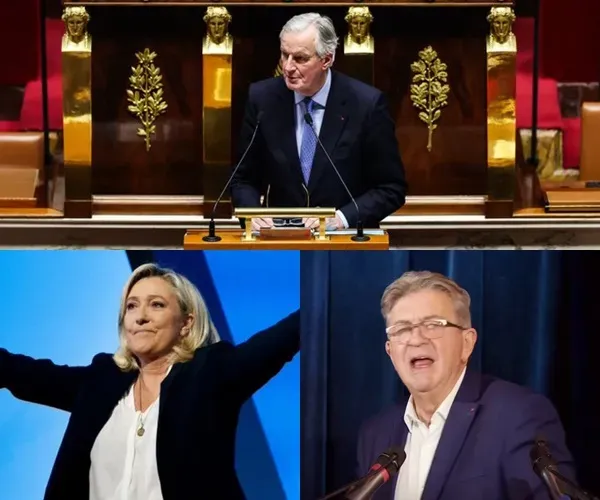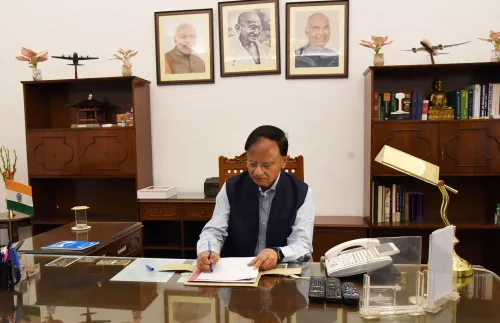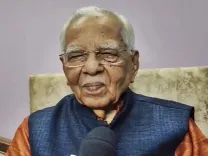The Future of France: Analyzing Political and Economic Consequences of the Government's Collapse

New Delhi, Dec 5 (NationPress) France is currently without a government as, in an unprecedented move, the coalition of the far-right and left has united to remove Prime Minister Michel Barnier merely a day before he marks three months in office, thrusting the nation into a fresh chapter of uncertainty with substantial and far-reaching consequences for both its politics and economy.
On Wednesday, the National Assembly passed a no-confidence motion against the government with 331 votes in favor out of the 577-member house, with the leftist group New Popular Front collaborating with Marine Le Pen's far-right National Rally. The repercussions of this vote extend well beyond the political future of the beleaguered Prime Minister.
The 73-year-old Barnier will be remembered in history for two significant reasons.
He now holds the record for being the shortest-serving Prime Minister of the Fifth Republic (established post-1958), with a tenure of just over 90 days, surpassing Premier Bernard Cazeneuve's 160 days in 2016-2017, and representing only a third of his predecessor Gabriel Attal's 240 days. He is also the second Prime Minister in history to be removed via a no-confidence vote, a full half-century after Georges Pompidou in 1962.
The collapse of Barnier's center-right administration has left the budget for the upcoming year in jeopardy, raising critical questions about future governance in light of the deadlock within the National Assembly, which is divided into three conflicting blocs, none of which holds a majority.
However, the primary casualty is not Barnier himself, whose passionate address in the Assembly failed to sway the National Rally, nor did his concessions regarding budget proposals. Instead, the real victim is President Emmanuel Macron, who has alienated both the left and the right with a series of politically reckless moves throughout the year.
After the vote, Marine Le Pen stated to the media that their choice to oppose the government—having abstained from the Left's initial no-confidence motion against Barnier in September—was a calculated decision aimed at "protecting the French people." This referred to the proposed budget, which included spending cuts and tax increases amid a rising deficit.
Jean-Luc Melenchon, leader of the largest party within NPF, France Unbowed, declared that the outcome was "inevitable" and called for Macron’s resignation.
Yet, Macron, currently in the midst of his second and final term, has repeatedly asserted that he will not step down.
The President's options now include appointing a new Prime Minister, and reports suggest that he has initiated this process after returning from a visit to Saudi Arabia. He may opt to form a non-political government of technocrats, a common approach in neighboring Italy, which has faced chaotic politics and fragmented mandates, although such a move would lack political legitimacy and likely struggle to function effectively in the current polarized environment.
Fresh parliamentary elections could offer a potential solution, but this option is restricted by the constitution until next July.
More pressing than the political turmoil is the economic situation that should alarm political stakeholders and the populace alike. The increasing budget deficit, currently exceeding 6 percent of GDP, is inflating public debt (now surpassing 3.2 trillion euros) and making financing increasingly expensive.
This, in turn, hampers the government’s ability to act, especially in a less-than-ideal climate across Europe, while spending cuts and tax increases are exacerbating the rise of populist forces.
France has already witnessed this phenomenon with the ascendance of both the far-right and the hard left at the expense of centrist parties.
The political turmoil in France takes on greater significance given its parallels in neighboring Germany, where Chancellor Olaf Scholz's "traffic light" coalition has collapsed after the expulsion of the Free Democratic Party, leaving his government in a minority position.
Upcoming elections are scheduled for early next year—at least six months ahead of schedule. While the right-wing Christian Democratic Union is anticipated to outperform Scholz's Social Democratic Party, the rise of the right-wing Alternative for Germany and the traditionally leftist yet socially conservative Sahra Wagenknecht Alliance is fracturing the political landscape, again to the detriment of centrist parties.
What is even more concerning is that these extreme—and populist—parties generally exhibit disdain for the European Union and its policies, particularly regarding immigration. They are also critical of the EU's stance on Ukraine and the sanctions imposed on Russia, which have adversely affected Germany and other European nations more than the government of President Vladimir Putin.
With the political impasse in both France and Germany—the EU's two largest powers and economies—amid significant global changes, the anticipated victory and forthcoming presidency of Donald Trump in 2025 could lead to an extraordinarily eventful period.
(Vikas Datta can be contacted at vikas.d@ians.in)









